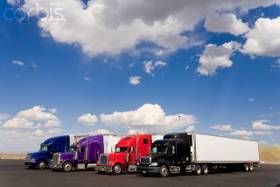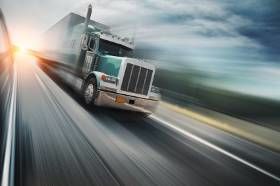Slip Seating
Topic 901 | Page 1

Slip seating is where you take your truck out for your time driving, be it a day,a week, etc. And when you bring it back to the terminal (for your time at home),you clean all your stuff out of it, cuz another driver is gonna put his stuff in it and drive his time, be it a say, a week, etc. Then he cleans it out, and you put your stuff back in....you get the idea. Forced dispatch is where what ever load your dispatcher gives you ,you take, to where ever it goes. Most O/O's don't have forced dispatch...but like any truck, if the truck ain't rollin' you ain't makin' any money. So O/O's don't "pick" as many of their loads as you'd think...they need to keep moving. A company driver doesn't have the choice of where he goes, or what he loads.
Terminal:
A facility where trucking companies operate out of, or their "home base" if you will. A lot of major companies have multiple terminals around the country which usually consist of the main office building, a drop lot for trailers, and sometimes a repair shop and wash facilities.
Dispatcher:
Dispatcher, Fleet Manager, Driver Manager
The primary person a driver communicates with at his/her company. A dispatcher can play many roles, depending on the company's structure. Dispatchers may assign freight, file requests for home time, relay messages between the driver and management, inform customer service of any delays, change appointment times, and report information to the load planners.Yap, Starcar is right.
When it comes to most regional , dedicated, and over the road jobs you get assigned one truck and that's yours. Nobody else will use it. But a lot of local jobs and a few dedicated or regional jobs will have a slip-seating setup where you just drive whatever truck is assigned to you or available for you that day. It might be a different truck every day - it may not. But slip seating menas you're sharing the trucks.
Forced dispatch basically means you have to take the load you're assigned. You don't have a choice. You can't say "No, I don't want that load. Give me a different one."
Now here's a really important reason to stay with a company long enough to establish a solid reputation as an "A List Driver" - you will at least have some say in the loads you're assigned. Once your dispatcher and the load planners know who you are and know you do an awesome job they're going to want to take pretty good care of you. So they'll be more willing to go out of their way to make sure you're getting your fair share of miles and decent runs. So say you willing run a couple of short runs in the Northeast right in a row and dispatch sends you a third. You can shoot a message to dispatch saying, "Hey, I've done the dirty work the past two runs. How about get me something with decent miles going anywhere but the Northeast so I'll have a decent paycheck and maintain my sanity?"
95% of the time dispatch will either get you a better run or a promise to get you a better run the next load. Trading favors is how the game is played. You develop a good relationship with a solid dispatcher and you work together. You know there are going to be some lousy runs that nobody wants, but those have to be moved just the same. If you'll run some of those without complaint and you're a safe, reliable driver, your dispatcher will "toss you a bone" with a nice "gravy run" to Texas or something sweet like that. That is how the industry works and the guys and gals that are "A list" drivers do this day in and day out. It's like one long, ongoing negotiation between a driver and dispatcher. You help each other out and make each other look good.
But most importantly, don't get the order of things confused. As a new driver at any company it's up to you to prove yourself before you're going to get the respect and treatment that the proven veterans get. Tons of people make this critical mistake and wind up out of the industry within a few weeks or months. They don't want to do the dirty work. They don't want to prove themselves. They just want everything handed to them even though they've never shown they can even handle it.
So go out there and show em what you're made of and maybe 6 months down the road you can start asking for some better runs and a few favors from time to time. If you're an awesome driver, you'll get the miles, you'll get your home time, and you'll get favors from time to time. Life on the road will be good.
That's how it works in the trucking industry.
Regional:
Regional Route
Usually refers to a driver hauling freight within one particular region of the country. You might be in the "Southeast Regional Division" or "Midwest Regional". Regional route drivers often get home on the weekends which is one of the main appeals for this type of route.
Over The Road:
Over The Road
OTR driving normally means you'll be hauling freight to various customers throughout your company's hauling region. It often entails being gone from home for two to three weeks at a time.
Dispatcher:
Dispatcher, Fleet Manager, Driver Manager
The primary person a driver communicates with at his/her company. A dispatcher can play many roles, depending on the company's structure. Dispatchers may assign freight, file requests for home time, relay messages between the driver and management, inform customer service of any delays, change appointment times, and report information to the load planners.HOS:
Hours Of Service
HOS refers to the logbook hours of service regulations.EPU:
Electric Auxiliary Power Units
Electric APUs have started gaining acceptance. These electric APUs use battery packs instead of the diesel engine on traditional APUs as a source of power. The APU's battery pack is charged when the truck is in motion. When the truck is idle, the stored energy in the battery pack is then used to power an air conditioner, heater, and other devices

your dispatcher will "toss you a bone" with a nice "gravy run" to Texas or something sweet like that
Brett, I bet, no, I KNOW that there are a couple of guys and gals on here who would argue with you about that...sounds like they would rather walk across broken glass bare footed rather than go back to Texas...
Dispatcher:
Dispatcher, Fleet Manager, Driver Manager
The primary person a driver communicates with at his/her company. A dispatcher can play many roles, depending on the company's structure. Dispatchers may assign freight, file requests for home time, relay messages between the driver and management, inform customer service of any delays, change appointment times, and report information to the load planners.
your dispatcher will "toss you a bone" with a nice "gravy run" to Texas or something sweet like that
Brett, I bet, no, I KNOW that there are a couple of guys and gals on here who would argue with you about that...sounds like they would rather walk across broken glass bare footed rather than go back to Texas...
I rather slide down a razor blaze into a pool of alcohol than go to Texas. Lol. The roads in PA and NY beat me up enough. I dont need to have the roads in TX beat the heal out of me also.
Dispatcher:
Dispatcher, Fleet Manager, Driver Manager
The primary person a driver communicates with at his/her company. A dispatcher can play many roles, depending on the company's structure. Dispatchers may assign freight, file requests for home time, relay messages between the driver and management, inform customer service of any delays, change appointment times, and report information to the load planners.
I lived in Texas all my life and whatever roads are bad, they are forever being repaired or widened or,or,or...But just like the weather in Texas, if a road is bad, wait 5 minutes and it will be under construction!

There are a variety of "slip seating" you might have 7 on 7 off. You might have a three way slip seating or 20 on and 10 off. That works where you drive for 10 days with Person A and 10 days with Person B and you are off for ten days while Person A and Person B drive for ten days. CRST has such a program.
Dave
What is "slip seating" and "forced dispatch"? Is this something that is an advantage or not?
Unfortunately my truck company does it to all the otrs if u so much as leave your truck at the terminal someone will be there driving it. I tore my rotator cuff back in February and was unable to climb back into my truck and needless to say alot of my stuff got stolen... I did get most of my stuff but unfortunately if you can't clean your truck out you r **** out of luck and have the chance of a thief being in it
Terminal:
A facility where trucking companies operate out of, or their "home base" if you will. A lot of major companies have multiple terminals around the country which usually consist of the main office building, a drop lot for trailers, and sometimes a repair shop and wash facilities.
OTR:
Over The Road
OTR driving normally means you'll be hauling freight to various customers throughout your company's hauling region. It often entails being gone from home for two to three weeks at a time.
your dispatcher will "toss you a bone" with a nice "gravy run" to Texas or something sweet like that
Brett, I bet, no, I KNOW that there are a couple of guys and gals on here who would argue with you about that...sounds like they would rather walk across broken glass bare footed rather than go back to Texas...
I know this is right. I am one of them.
Dispatcher:
Dispatcher, Fleet Manager, Driver Manager
The primary person a driver communicates with at his/her company. A dispatcher can play many roles, depending on the company's structure. Dispatchers may assign freight, file requests for home time, relay messages between the driver and management, inform customer service of any delays, change appointment times, and report information to the load planners.New Reply:
New! Check out our help videos for a better understanding of our forum features

















Preview:








 TT On Facebook
TT On Facebook
What is "slip seating" and "forced dispatch"? Is this something that is an advantage or not?